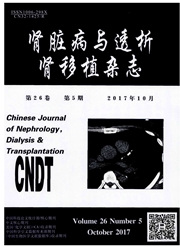

 中文摘要:
中文摘要:
移植肾早期不可避免地存在缺血再灌注损伤(IRI),对移植。肾的早期恢复和远期预后均有重要影响。缺血-再灌注除损伤肾小管上皮细胞外,还导致间质炎症和微血管病变;而后者是IRI引起肾功能障碍的关键。缺血后微血管病变以内皮细胞肿胀和随之而来的微血管闭塞为特征,导致再灌注不能顺利进行(无复流现象)。阐明内皮细胞功能障碍机制,为移植肾IRI的治疗提供新思路。
 英文摘要:
英文摘要:
Ischemia-reperfusion injury (IRI) has been an inevitable event accompanying kidney transplantation. It has a profound influence on both the early and the late function of a transplanted kidney. Ischemia-reperfusion does not exclusively lead to alterations of epithelial cells but also causes interstitial inflammation and interstitial microvaseulopathy. Both inflammation and microvasculopathy are particularly important in terms of post-ischemic kidney repair. Post-ischemic microvasculopathy is characterized by endothelial cell swelling with subsequent microvascular occlusion. Thus, reperfusion is inhibited ( no-reflow phenomenon). Such endothelial cell dysfunction offers new therapeutic perspectives in IRI in renal transplantation.
 同期刊论文项目
同期刊论文项目
 同项目期刊论文
同项目期刊论文
 Endothelial injury in transplant glomerulopathy is correlated with transcription factor T-bet expres
Endothelial injury in transplant glomerulopathy is correlated with transcription factor T-bet expres De novo development of circulating anti-endothelial cell antibodies rather than pre-existing antibod
De novo development of circulating anti-endothelial cell antibodies rather than pre-existing antibod Special Malignancy Pattern in Chinese Renal Transplantation Recipients: A Single Center Experience a
Special Malignancy Pattern in Chinese Renal Transplantation Recipients: A Single Center Experience a 期刊信息
期刊信息
